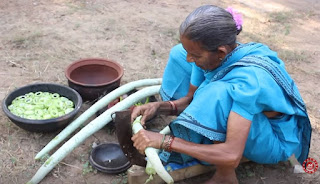 |
| Photo from https://en.wikipedia.org |
One of the most dangerous species of scorpions known to man is
Hottentotta Tamulus. Apparently its name is derived from the name of the Tamil people as it is found in abundance in Tamilnadu. Its venom contains a very potent neuro-toxin known to cause fatalities in humans if not treated quickly. In the old days, it was quite common for people to die of a scorpion bite.
This is the story of Ananthalakshmi and the scorpion.
Ananthalakshmi was born into a middle class educated family at the beginning of the 20th century. She was married to KP Venkatarao (KPV) when she was 6 years old and had her first child at 14. By the age of 22, Ananthalakshmi had four girls - Satyabhama (Bhama), Cauveri, Kamla, and Radha. Her fifth child she lost after carrying it to term.
Each of the girls were born in Ananthalakshmi's parents' home in Namakkal. So when it was time in 1928 for Ananthalakshmi's sixth childbirth, she went to her parents' home, four little girls in tow. A home that housed her father and his brothers' families.
 |
| Drumstick Hulli |
During this sixth pregnancy, Ananthalakshmi craved hulli (sambar in Kannada), made extra sour with tamarind. Everyday when the hulli was ready, she took out a portion for herself and added a hefty portion of tamarind juice.
One summer afternoon, when the kitchen ran out of tamarind, Ananthalakshmi went to the outhouse storeroom to get some. In those days, most large homes had an outhouse storeroom - a windowless shed with thick insulating walls, built under leafy trees. This ensured that the storeroom stayed cool and fruit, vegetables, and groceries could be stored within easy reach of the kitchen. Grains were stored in sacks. Unripened bananas were hung upside-down. Spices, pickles, gur, and tamarind were kept in earthenware jars.
 |
Traditional Earthenware Jars
Photo Courtesy www.tradeindia.com
|
Ananthalakshmi waddled into the dark storeroom and searched for the earthenware jar that contained the tamarind. She found it on a shelf at the back of the room. Slipping the lid off with her left hand, she reached into the jar to pull out a fistful of tamarind.
To her horror, she felt the claws and legs of a scorpion brush her hand. Instantly she pulled her hand out of the jar, shut the lid, and screamed - long and loud. Her terrified scream reverberated in the old house, calling every adult and child to come running to the rescue to the storeroom.
 |
Scorpion Bomb
Photo Courtesy www.Smithsonianmag.com |
That afternoon, the eldest male in the house was 12 year-old Sheshagiri Rao (of
Salem Bananti fame). All the women in the household, looked at Sheshagiri Rao to be the brave soul to capture and kill the scorpion, so that Ananthalakshmi could have her specially sour hulli. After all, she was pregnant, and in this family, no one dared to deny a pregnant woman's wish.
Sheshagiri Rao, a boy on the cusp of manhood, keenly felt the pressure of the collective wish of the household to be brave. All the women said it. It was a man's duty after-all. Duty to be brave and protect women and children. He could feel that pressure like warm viscous liquid in his veins even as fright turned his stomach to mush.
 |
Photo Courtesy
www.sheknows.com |
Sheshagiri Rao, took a blanket and wrapped multiple layers over his arm and hand, punching the palm of his right hand with his left to create an indentation - creating something like a baseball mitt. He then gingerly entered the dark storeroom. His heart pounding hard, he made his way to the dangerous tamarind jar. Gathering all his courage, he whipped off the lid and rammed his blanket covered hand into the jar. His hand closed over the scorpion tightly and he pulled it out of the jar.
Triumphantly, he carried the blanket-covered captured scorpion out of the storeroom. He then placed it under his foot and crushed the blanket-encased scorpion. The crunch of its exoskeleton could be heard by all. For good measure, he jumped up and down on the blanket-encased scorpion, till it was pulverised into a chutney consistency. The women of the household cheered his bravery and Sheshagiri Rao beamed with happiness. He was then carried off to the kitchen for sweet lime water and ladoos in honour of his bravery.
 |
Doesn't this look like a scorpion
stuffed into a tamarind shell |
Ananthalakshmi stayed behind, looking at the blanket-covered-chutney-consistency scorpion. She was left with the task of cleaning-up the mess. She gathered the blanket and it's pulverised cargo, and took it to the hand-pump. With her right hand she pumped out water as she shook the blanket with her left hand.
Imagine her surprise as squashed and pulverised tamarind fell out of the blanket!!




































